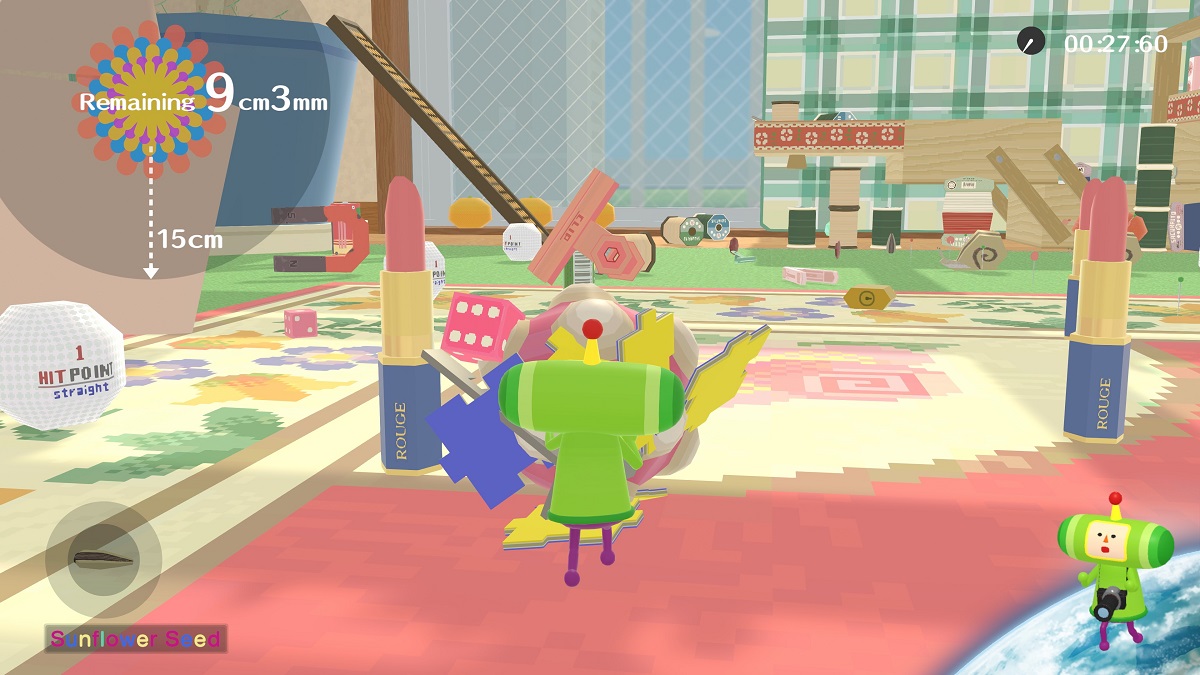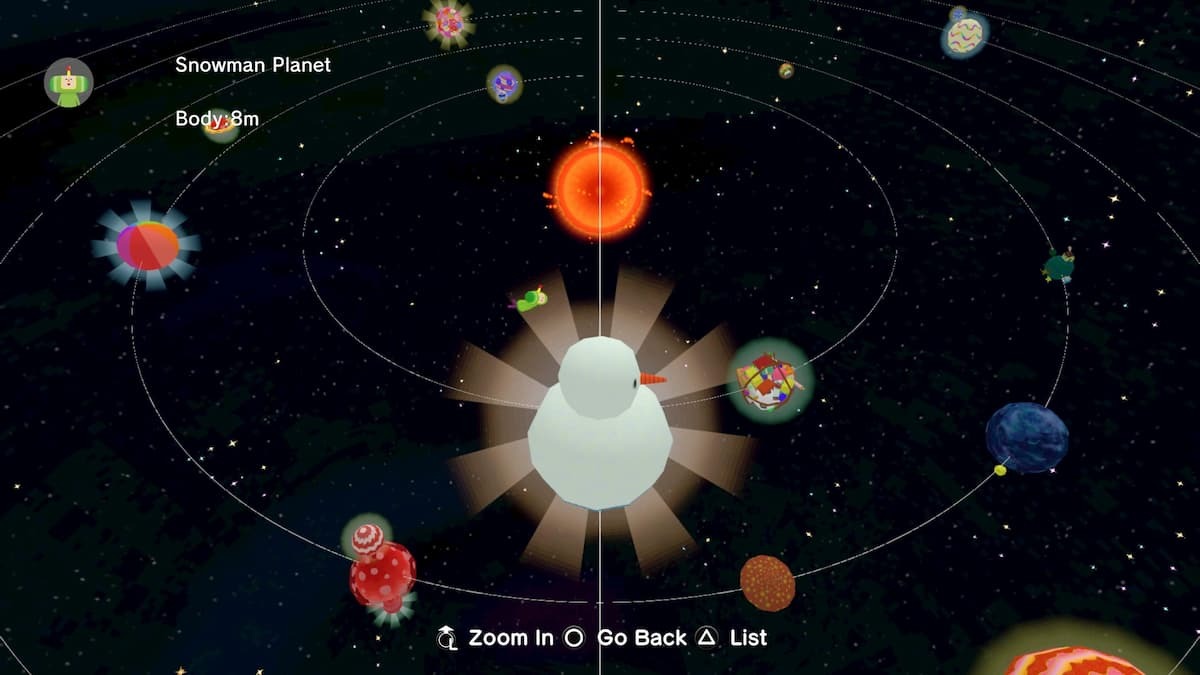Hello. It’s me: the most biased possible writer to be reviewing this game. Want an anecdote? I got bullied in the fourth grade of elementary school for reading the inner pamphlet of We Love Katamari on the school bus. Maybe because it looks like this, or maybe because those kids didn’t know the joy of the Katamari. Whatever the reason, my spirits were not dampened. We Love Katamari REROLL + Royal Reverie brings me back to one of my all-time favorite games as an adult, re-experiencing the unfettered joy of playing it again for the very first time.
There are a lot of Katamari games now, but only two of them were helmed by series creator Keita Takahashi: Katamari Damacy and We Love Katamari.
We Love Katamari is a delightfully reluctant sequel. Spurred by the success of the first game, Takahashi makes several light jabs at the audience clamoring for “more.” Nonetheless, the Prince and his hot, abusive father, the King, are here to deliver the goods.
The plot? The King has destroyed all the stars in the cosmos. By accident, of course. The Prince and his numerous, ill-shapen Cousins must roll Katamari to replace the stars in the sky with celestial bodies of sugary treats, household items, and scores and scores of living beings of varying sentience. Don’t worry, they’re just happy to be there.

Most of these levels involve rolling as big as possible or to a certain size as fast as possible — and these are where the game shines brightest. The core gameplay of rolling items only a little smaller than you to gain size quickly works best when your only objective is getting as large as possible.
Other, more tenuously-enjoyable levels involve meeting some criteria, like getting as close as possible to a target size. Another asks that you roll as many lightning bugs as possible so a bookworm can study in the dark. The most perilous involves rolling either a cow or bear into your Katamari – but only one. As soon as you roll up any tangentially bear or cow-related object, the level ends, making for a tense (and sometimes maddening) experience.
The levels are each accessed from a charming overworld screen that I spent more time with than my flesh-and-blood family in the year 2005. Here, fans of the first game and various citizenry who want tasks completed will petition the King to roll them a Katamari of some proportion or specification.
But I give these less-favorable levels a pass. Why? They’re still fun. Rolling the Katamari is fun. And guess what? Who cares if you did a good job? Well, okay, the King and fans care a little, but they’re always down to give it another go. Your personal goals are the only ones We Love Katamari cares about. The obtuse scoring system, by which planets emit various glows according to how “well” you did, is the only indicator of your success.

The one emotion We Love Katamari seeks to spark is one of joy. From the wonderous Shibuya-kei soundtrack to the bright, pastel colors and hilariously low-polygon models, everything is pure serotonin.
This easygoing atmosphere is reflected in the deceptively simple controls: you only use analog sticks to control the Katamari. They’re basically tank controls: pretty intuitive, but also somewhat unwieldy. This is by design, and presents the main challenge of the game: getting where you want, when you want. Dash rolls are a good way to cover distance quickly, but smashing into obstacles will see you losing parts (and therefore size). Quick turns are a godsend, allowing you to turn 180 degrees in an instant. Besides these two maneuvers, you’ll be rolling along at a modest pace, simply trying to plan a route forward and hoping you’re big enough to roll everything up.
The soundtrack of We Love Katamari is one of legendary, genre-defining proportions. The microgenre of Shibuya-kei emerged from Japan’s booming economy and consumer culture of the 1990s. It’s a sample-heavy, hypnagogic genre of pop music that features inventive soundscapes and melodic stylings similar to that found in jazz fusion. With a focus on warmth and nostalgia, it’s the perfect fit for Katamari. Katamari Damacy was no slouch in the music department, and its sequel features remixes of fan favorites and a slew of new material, from J-rock to future funk.
If you’re a Katamari weirdo like me, you’ll love the Collections tab. Here, you can view every low-poly item you’ve rolled up in detail, along with brief and at times hilarious descriptions of each. As a kid, I actually learned a lot about Japanese culture from these descriptions, particularly about food and cultural items like the teru teru bozu. Seeing rainbow-colored text on a rolled-up item means it’s new to your collection: something you’ll be cheering for as the hours wear on.

I honestly get emotional just thinking about this game, and as I said, I’m probably the most biased reviewer of all time in that regard. Still, putting my big-boy objective hat on for a second, I do wish we got a little more in the way of “bonus content.” The side adventure and accompanying cutscenes about the King’s childhood are nice, and certainly more than they could’ve added, but there’s a lot of this world the games have yet to explore. And those pain point levels I mentioned earlier certainly haven’t gone anywhere: when I want to replay some We Love Katamari I’m reluctant to choose any of these more specialized excursions.
All that said, We Love Katamari REROLL + Royal Reverie is as close to a perfect remaster as I could’ve asked for. There was simply no way to play this game outside the original hardware, and I am infinitely grateful to have been blessed with this remaster. I’ve shown so many friends this series thanks to this release, and I think that’s incredibly in the spirit of the game as a whole. We should all be grateful games like Katamari exist at all, and I hope a new audience discovers the unbridled joy of the series thanks to these remasters.
This review is based on the PlayStation 5 version of the game. A code was provided for review by Bandai Namco.
Fantastic
Thanks to this much-needed remaster, a new generation can finally experience the joy, and hope, of We Love Katamari.
We Love Katamari REROLL + Royal Reverie
